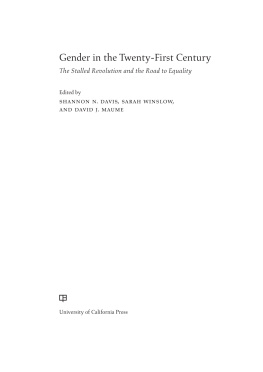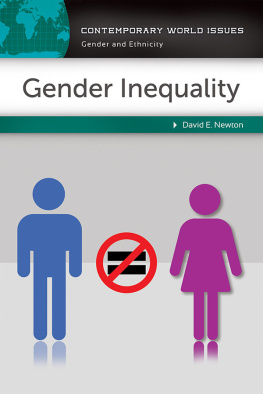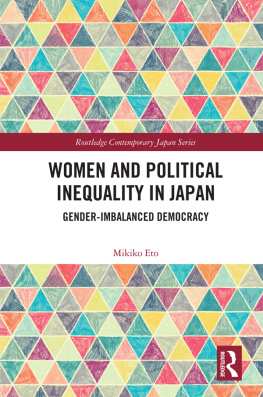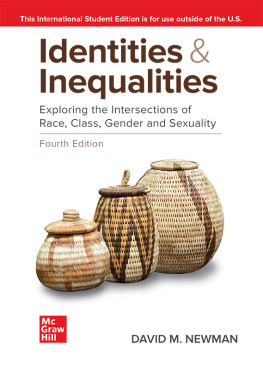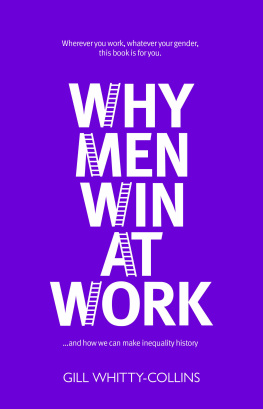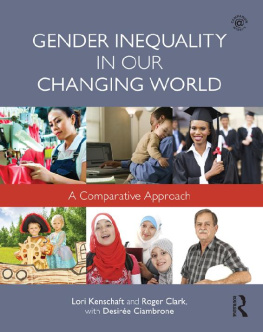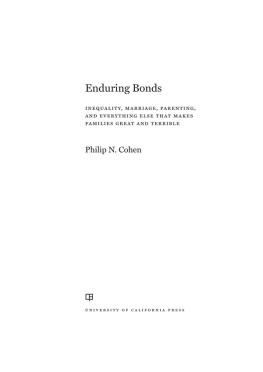Contents
Guide
Pages

The Persistence of Gender Inequality
Mary Evans
polity
Copyright Mary Evans 2017
The right of Mary Evans to be identified as Author of this Work has been asserted in accordance with the UK Copyright, Designs and Patents Act 1988.
First published in 2017 by Polity Press
Polity Press
65 Bridge Street
Cambridge CB2 1UR, UK
Polity Press
350 Main Street
Malden, MA 02148, USA
All rights reserved. Except for the quotation of short passages for the purpose of criticism and review, no part of this publication may be reproduced, stored in a retrieval system, or transmitted, in any form or by any means, electronic, mechanical, photocopying, recording or otherwise, without the prior permission of the publisher.
ISBN-13: 978-0-7456-8995-1
A catalogue record for this book is available from the British Library.
Library of Congress Cataloging-in-Publication Data
Names: Evans, Mary, 1946- author.
Title: The persistence of gender inequality / Mary Evans.
Description: Cambridge, UK ; Malden, MA : Polity Press, 2016. | Includes bibliographical references and index.
Identifiers: LCCN 2016017192 (print) | LCCN 2016028399 (ebook) | ISBN 9780745689913 (hardcover : alk. paper) | ISBN 0745689914 (hardcover : alk. paper) | ISBN 9780745689920 (pbk. : alk. paper) | ISBN 0745689922 (pbk. : alk. paper) | ISBN 9780745689944 (mobi) | ISBN 9780745689951 (epub)
Subjects: LCSH: Sex discrimination. | Womens rights. | Equality. | Sex role.
Classification: LCC HQ1237 .E9175 2016 (print) | LCC HQ1237 (ebook) | DDC 305.3--dc23
LC record available at https://lccn.loc.gov/2016017192
The publisher has used its best endeavours to ensure that the URLs for external websites referred to in this book are correct and active at the time of going to press. However, the publisher has no responsibility for the websites and can make no guarantee that a site will remain live or that the content is or will remain appropriate.
Every effort has been made to trace all copyright holders, but if any have been inadvertently overlooked the publisher will be pleased to include any necessary credits in any subsequent reprint or edition.
For further information on Polity, visit our website: www.politybooks.com
Acknowledgements
I have many people to thank for their various forms of help and support. My thanks, therefore to Emma Longstaff, who first suggested that I write this book, and subsequently to Jonathan Skerrett of Polity for all his help and that of the anonymous reviewers of earlier drafts of this book. Fiona Sewell was an exemplary copy editor, whose work here has been invaluable. I should also like to thank everyone, staff and students, at the Gender Institute of the London School of Economics for providing such a supportive and informative context whilst I was writing this book. It has been a privilege and a pleasure to be there.
I want to acknowledge the part that wide-ranging conversations, often about subjects other than this book, have played in enlivening the process of writing it. So my very warm thanks to Rose Abderabbani, Anne Barron, Liz Cocks, Elizabeth Cowie, Marie Corbin, Diane Cunningham, Kathy Davis, Barbara Einhorn, Sarah Evans, John Jervis, Hazel Johnstone, Cadence Kinsey, Sonia Kruks, Jan Montefiore, Janet Sayers, Maggie Schaedel, Jenny Uglow, Clare Ungerson and Anna Witham. Ralph Kinnear gave crucial help with the final stages of the manuscript. My sons Thomas and James have provided an endless source of happiness as well as much-valued forms of assistance.
Preface
This book is written against the backdrop of bitter and devastating conflicts in many parts of the world. In many of those contexts one of the central issues is the appropriate order of relations between men and women. Whilst the social and political rights of women are greater in some places than others, there is no country where gender equality has been achieved. The question of why not, of why change should be so difficult and so challenging, is the subject here. From what Laura Bates has described as everyday sexism to brutally enforced regimes of gender differentiation, biological difference continues to bring with it distinct, and often radically distinct, implications. Addressing this reality and the part that it continues to play in global politics is the subject here. Not least in the discussion is the issue of who profits from gendered inequality.
Questions about the relationship between women and men have a long lineage, and this book does not intend to review that long history or the academic work about it. This book is essentially about the present, about what is called, variously, late capitalism, neoliberalism or late modernity. There is considerable distance between these titles but all relate to the world of the twentieth and twenty-first centuries. It is commonly assumed that connections and relationships between parts of this world are closer than ever before. In this, what is also often assumed and it will be a central issue discussed here is that the lives of men and women are becoming more similar, and that distinctions made on the basis of biology are disappearing. What continues is that men and women share, as they have always done, the immediate circumstance of their lives, and for many people alive today that circumstance is the political economy of capitalism; not the form known to historians of the eighteenth or nineteenth century but the form about which Beatrix Campbell has written [this] new articulation of capitalism and patriarchy is hegemonic. That does not make it stable: all over the world there is tumult and resistance.
The tumult and resistance of which Campbell writes have various forms, from those not specifically focused on gender politics, such as the Arab Spring or the protests of the Occupy movement in the United States, to those much more explicitly about gender, such as protests about sexual violence against women, internet sexism or punitive attacks on homosexuality. Globally, however, what is clear is that the politics of gender are part of what the sociologists Luc Boltanski and Eve Chiapello have described as the new spirit of capitalism, a form which has produced a curious paradox: that of the increasing instability and uncertainty of material existence accompanied by an abandonment of previous forms of the control of individual choices, notably that of sexuality. In the UK, for example, the years 201015 have seen a determined assault on all forms of state provision whilst a new Conservatism allows diverse forms of sexual relationships, for example that of same-sex marriage. In this context, what will be explored in the following pages are the complexities of not only the continuity of gender inequality but also its constant reappearance in new forms. In particular, what will be suggested is that whilst millions of women, by virtue of their biological association with care, are widely exploited, the fantasies and ideals of femininity constitute the basis of exploitative and highly profitable forms of consumption.
These two aspects of the exploitation of women and the feminine are found in the context of a growing social inequality that besets the lives of men and women throughout the world. The optimism of previous decades, in which the goal of the elimination of poverty was the aspiration of many countries, has been replaced by more pessimistic expectations in which it is assumed that the majority will not see rising standards of living. But the politics necessary to contest this has to recognize more specific forms of inequality than that of overall social inequality, forms which do not just produce different aspects of inequality but contribute to and help to maintain overall social inequality. The persistence of gender inequality is not, therefore, only about the specific inequalities and injustices experienced by women but about the ways in which those conditions help to maintain general, structural and increasingly considerable forms of inequality. The aim here is to explore the part that the various forms, processes and contexts of gender differentiation play in maintaining a wider order of social inequality.









